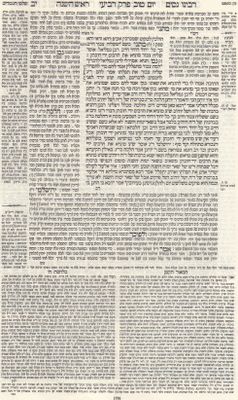
HIDE/SHOW IMAGE
12a
{Rosh haShana 34b continues}
even though this {where they bless} is for certain and this {where they blow} is a doubt.
"Just as the shliach tzubur {agent of the congregation} is obligated, so is each and every individual obligated. Rabban Gamliel says: The shliach tzibur is motzi the congregation their obligation {such that he fulfills on their behalf}":
They learnt {in a brayta}: They said to Rabban Gamliel: According to your words, why does the congregation pray {beforehand, silently}?
He said to them: In order that the shliach tzubbur may arrange his tefillah.
Rabban Gamliel said to the Sages: According to you, why does the shliach tzibbur descend before the Aron {and say chazzarat haShatz?
They said to him: In order to fulfill on behalf of he who is not expert.
He said to them: Just as he fulfills on behalf of he who is not expert, so does he fulfill on behalf of he who is expert.
Rabba bar bar Chana cited Rabbi Yochanan: The Sages agree with Rabban Gamliel in regard to the blessings of Rosh haShana.
And Rav said: It is still a dispute {even in this case}.
And does Rabbi Yochanan indeed say this? But Rabbi Yochanan said: The halacha is like Rabban Gamliel by the blessings of Rosh haShana and of Yom Kippur. "Halacha" implies that there is a dispute in the matter!
Rava said: Who "agrees"? Rabbi Meir. And "halacha" implying that there is a dispute refers to the Sages. For they learnt {in a brayta}: The blessings of Rosh haShana and Yom Kippur, the shliach tzibbur fulfills on behalf of the public their obligation.
For they learnt {in a brayta}: The blessings of Rosh HaShana and Yom Kippur, the shliach tzibbur fulfills on behalf of the public. These are the words of Rabbi Meir. And the Sages say: Just as the shliach tzibbur is obligated, so is each and every individual who is expert obligated.
And so is the halacha.
And those in the fields for whom it is not under their control and they are unable to come to the synagogue on Rosh Hashana and Yom Kippur, the shliach tzibbur also fulfills their obligation on their behalf. But those of the city {who those are able to come}, the shliach tzibbur does not fulfill their obligation on their behalf, until they come to the synagogue and hear from the shliach tzibbur from the beginning until the under {under the principle of שומע כעונה}.
Yerushalmi: "Rabban Gamliel says: The shliach tzibbur fulfills on behalf of public their obligation, etc." Rav Huna of Tzipporit cited Rabbi Yochanan: The halacha is like Rabban Gamliel in these blowings {and associated Shemoneh Esrei} -- and this is where he was there from the beginning of the tefillah {=Shemoneh Esrei}.
And why are the blessings of Rosh Hashana and Yom Kippur different such that the shliach tzibbur fulfills on behalf of the public their obligation, which is not the case during the other days of the year? Because they have more blessings. For every Shabbat and Yom Tov of the rest of the days of the year, there are seven {blessings in Shemoneh Esrei} and these are nine.
Rabbi Eleazar said: One should always order {=arrange} his tefilla {=Shemoneh Esrei} and afterwards pray.
Rava said: Rabbi Eleazar's words are logical as regards the blessings of Rosh Hashana and Yom Kippur and of Perakim {such as Rosh Chodesh or Yom Tov}, but of the rest of the days of the year, it is unneccessary.
And how much is "perakim?" From thirty days and on.
We learn in Eruvin {40a}: Rava {our gemara: Rabba} said: When we were in the house of Rav Huna {presumably the academy of Sura, where Rav Huna was the Resh Mesivta},



No comments:
Post a Comment